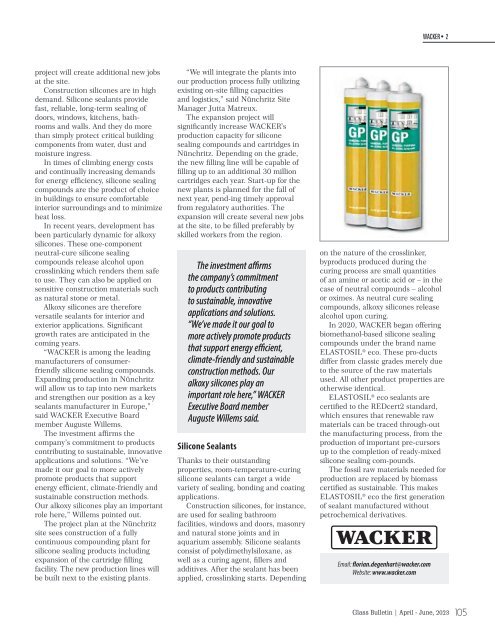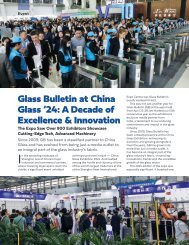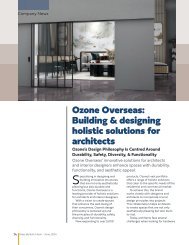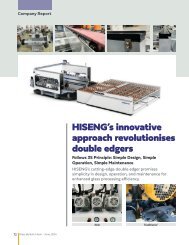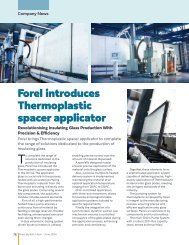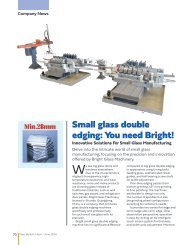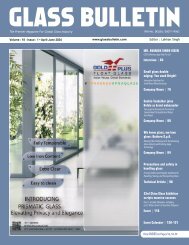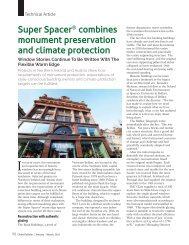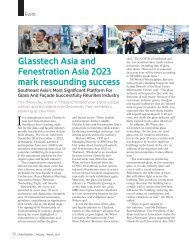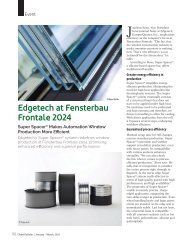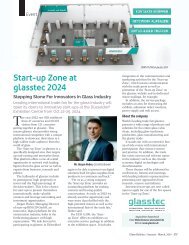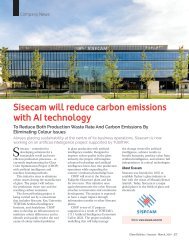Edition 70 (April-June, 2023)
You also want an ePaper? Increase the reach of your titles
YUMPU automatically turns print PDFs into web optimized ePapers that Google loves.
WACKER• 2<br />
project will create additional new jobs<br />
at the site.<br />
Construction silicones are in high<br />
demand. Silicone sealants provide<br />
fast, reliable, long-term sealing of<br />
doors, windows, kitchens, bathrooms<br />
and walls. And they do more<br />
than simply protect critical building<br />
components from water, dust and<br />
moisture ingress.<br />
In times of climbing energy costs<br />
and continually increasing demands<br />
for energy efficiency, silicone sealing<br />
compounds are the product of choice<br />
in buildings to ensure comfortable<br />
interior surroundings and to minimize<br />
heat loss.<br />
In recent years, development has<br />
been particularly dynamic for alkoxy<br />
silicones. These one-component<br />
neutral-cure silicone sealing<br />
compounds release alcohol upon<br />
crosslinking which renders them safe<br />
to use. They can also be applied on<br />
sensitive construction materials such<br />
as natural stone or metal.<br />
Alkoxy silicones are therefore<br />
versatile sealants for interior and<br />
exterior applications. Significant<br />
growth rates are anticipated in the<br />
coming years.<br />
“WACKER is among the leading<br />
manufacturers of consumerfriendly<br />
silicone sealing compounds.<br />
Expanding production in Nünchritz<br />
will allow us to tap into new markets<br />
and strengthen our position as a key<br />
sealants manufacturer in Europe,”<br />
said WACKER Executive Board<br />
member Auguste Willems.<br />
The investment affirms the<br />
company’s commitment to products<br />
contributing to sustainable, innovative<br />
applications and solutions. “We’ve<br />
made it our goal to more actively<br />
promote products that support<br />
energy efficient, climate-friendly and<br />
sustainable construction methods.<br />
Our alkoxy silicones play an important<br />
role here,” Willems pointed out.<br />
The project plan at the Nünchritz<br />
site sees construction of a fully<br />
continuous compounding plant for<br />
silicone sealing products including<br />
expansion of the cartridge filling<br />
facility. The new production lines will<br />
be built next to the existing plants.<br />
“We will integrate the plants into<br />
our production process fully utilizing<br />
existing on-site filling capacities<br />
and logistics,” said Nünchritz Site<br />
Manager Jutta Matreux.<br />
The expansion project will<br />
significantly increase WACKER’s<br />
production capacity for silicone<br />
sealing compounds and cartridges in<br />
Nünchritz. Depending on the grade,<br />
the new filling line will be capable of<br />
filling up to an additional 30 million<br />
cartridges each year. Start-up for the<br />
new plants is planned for the fall of<br />
next year, pend-ing timely approval<br />
from regulatory authorities. The<br />
expansion will create several new jobs<br />
at the site, to be filled preferably by<br />
skilled workers from the region.<br />
The investment affirms<br />
the company’s commitment<br />
to products contributing<br />
to sustainable, innovative<br />
applications and solutions.<br />
“We’ve made it our goal to<br />
more actively promote products<br />
that support energy efficient,<br />
climate-friendly and sustainable<br />
construction methods. Our<br />
alkoxy silicones play an<br />
important role here,” WACKER<br />
Executive Board member<br />
Auguste Willems said.<br />
Silicone Sealants<br />
Thanks to their outstanding<br />
properties, room-temperature-curing<br />
silicone sealants can target a wide<br />
variety of sealing, bonding and coating<br />
applications.<br />
Construction silicones, for instance,<br />
are used for sealing bathroom<br />
facilities, windows and doors, masonry<br />
and natural stone joints and in<br />
aquarium assembly. Silicone sealants<br />
consist of polydimethylsiloxane, as<br />
well as a curing agent, fillers and<br />
additives. After the sealant has been<br />
applied, crosslinking starts. Depending<br />
on the nature of the crosslinker,<br />
byproducts produced during the<br />
curing process are small quantities<br />
of an amine or acetic acid or – in the<br />
case of neutral compounds – alcohol<br />
or oximes. As neutral cure sealing<br />
compounds, alkoxy silicones release<br />
alcohol upon curing.<br />
In 2020, WACKER began offering<br />
biomethanol-based silicone sealing<br />
compounds under the brand name<br />
ELASTOSIL ® eco. These pro-ducts<br />
differ from classic grades merely due<br />
to the source of the raw materials<br />
used. All other product properties are<br />
otherwise identical.<br />
ELASTOSIL ® eco sealants are<br />
certified to the REDcert2 standard,<br />
which ensures that renewable raw<br />
materials can be traced through-out<br />
the manufacturing process, from the<br />
production of important pre-cursors<br />
up to the completion of ready-mixed<br />
silicone sealing com-pounds.<br />
The fossil raw materials needed for<br />
production are replaced by biomass<br />
certified as sustainable. This makes<br />
ELASTOSIL ® eco the first generation<br />
of sealant manufactured without<br />
petrochemical derivatives.<br />
Email: florian.degenhart@wacker.com<br />
Website: www.wacker.com<br />
Glass Bulletin | <strong>April</strong> - <strong>June</strong>, <strong>2023</strong> 105


